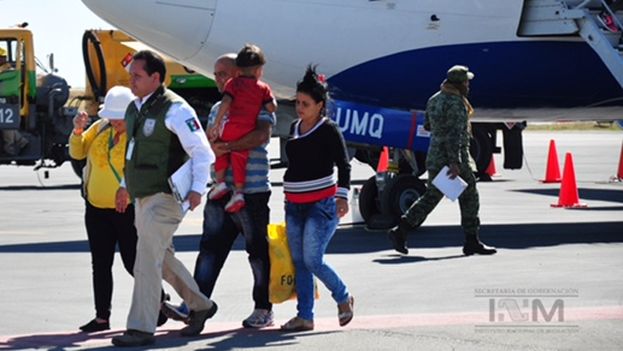
![]() 14ymedio, 4 May 2016 — The memorandum of understanding between the governments of Cuba and Mexico that governs migration between the two countries is now in force. The agreement allows, starting now, automatic deportations from Mexico to Cuba to “strengthen cooperation between the two countries in the fight against illegal migration, human trafficking and smuggling.” Signed on 6 November of last year, the agreement went into effect on 1 May, as confirmed in a statement from Cuba’s Ministry of Foreign Affairs on Wednesday.
14ymedio, 4 May 2016 — The memorandum of understanding between the governments of Cuba and Mexico that governs migration between the two countries is now in force. The agreement allows, starting now, automatic deportations from Mexico to Cuba to “strengthen cooperation between the two countries in the fight against illegal migration, human trafficking and smuggling.” Signed on 6 November of last year, the agreement went into effect on 1 May, as confirmed in a statement from Cuba’s Ministry of Foreign Affairs on Wednesday.
Starting now, Cuba agrees to accept the return of citizens who enter Mexican territory illegally, or who are in Mexico “irregularly” after emigrating illegally to countries in Central America, or “who are temporarily abroad within legal terms established by its immigration regulations and have an ‘irregular immigration status’ in the Mexican territory, except those authorized to travel to the United States of America.”
Returns will be made by air, or as an exception where appropriate by sea, and the cost will be borne by the sending country. Irregular migrants who are intercepted should be reported to their countries of origin, which must respond within 15 days to initiate the return. This will take effect a maximum of 15 days after receiving a response.
Since 2008, Mexican immigration legislation provides for deportations involving the interception of boats, the capture of traffickers and the “realization of operations to return the nationals of both parties by sea.”
In practice, however, the Mexican government is awarding legal status to a good part of the irregular Cuban migrants detained in their territory, sheltering them under the “law of refugees and complementary protection,” approved in 2012, and guaranteeing the undocumented the chance to not be returned to “the territory of another country where their life was threatened or they were in danger of being subjected to torture or other cruel, inhuman or degrading punishment,” even if they were not recognized as refugees.
In the last migration crisis, Mexico participated actively in the agreement with Panama, Costa Rica and El Salvador, receiving more than 6,000 Cubans who were offered provisional documents on humanitarian grounds to stay in the country for 20 days and continue on their way to the United States. Despite the agreement that has just come into force, solutions like this could continue to happen under Article 19, which provides for the suspension of the agreement “for reasons of protection of public order or state security, as well as for health reasons or force majeure,” that is circumstances beyond the control of either party.
The memorandum also states that citizens of any country who are not covered in the agreement of 1994 for the abolition of the visa requirement, must obtain the relevant documentation and both Cuba and Mexico agree to exchange available information.
Relations between Cuba and Mexico have strengthened in recent months, particularly since the visit of Raul Castro to the that country in November 2015. One result of the trip is the Binational Chamber of Commerce, presented this Monday, which involves several collaborative programs (academic-diplomatic, tourism and food) and a letter of intent for technical collaboration in basic education.
